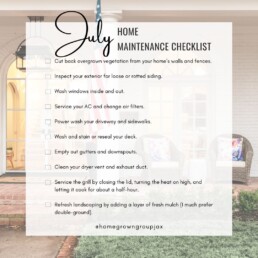Glossary of Real Estate Terms
Glossary of Real Estate Terms
Glossary of Real Estate Terms
Appraisal An appraisal is required to gather the estimated value of a piece of real estate. During the home sale, the mortgage lender sends out an appraiser to get a professional opinion of the value of the property. This helps the lender decide if the property is worth the amount of the loan the potential buyer is seeking.
Appraisal Contingency An appraisal contingency is a clause that allows a buyer to dissolve a purchase agreement if a home’s appraised value is less than the sale price. An appraiser hired by the Buyer’s lender evaluates the value of the home to ensure that the loan is secured by an appropriate home value.
Covenants, Conditions & Restrictions (CC&Rs) Usually, these are the rules and regulations placed on real property by a homeowner’s association (HOA), a neighborhood association, a developer, or a builder that sets forth any requirements and limitations of what a homeowner is allowed to do with the property. It may also include monthly and/or annual fees or special assessments.
Closing is when the home sale is considered final, which typically includes all parties’ signatures on all required documents, all monies conveyed, and when a lender is involved, with full lender’s approval. For some markets across the nation, recording the deed with the county clerk’s office is the ultimate and final step of closing. Once all these items are completed, then a Buyer’s access to the property is then provided, and the Buyer is considered the new homeowner.
Closing Costs are an assortment of fees, including fees charged by a lender, the title company, attorneys, insurance companies, taxing authorities, homeowner’s associations, real estate agents, and other closing settlement related companies. These closing costs are typically paid at the time of closing a real estate transaction.
Debt-to-Income Ratio Debt-to-income, or DTI, ratio is a number used by mortgage lenders which is determined by the total of your debt expenses, plus your monthly housing payment, divided by your gross monthly income, and multiplied by 100. This helps lenders determine affordability based off their available loan programs and allows them to estimate how much you can afford to pay monthly for a mortgage. Lenders typically look for borrowers who pay 28%, or less, of their total monthly income on housing, and less than 36 percent of their income on debt payments, according to Investopedia. If either percentage is on the higher side, and you want to buy a home, you might need to adjust your budget.
Due Diligence A due diligence period might be available in the purchase agreement, which is a time frame provided to a buyer to fully examine a property, often by hiring experts to inspect the property, perform tests, etc., so that a buyer may decide on how to proceed. A Buyer might also be afforded an opportunity to renegotiate the contract based off their findings or possibly even to terminate within a specified time, to not be considered in default of the contract. Due diligence allows a Buyer to fully understand what they are buying.
Earnest Money Deposit (EMD) An earnest money deposit (EMD), sometimes referred to a “good faith deposit”, is the initial funds that a buyer is asked to put down once a Seller accepts the Buyer’s offer. It shows not only that the Buyer is serious about buying, but that they are also willing to put their money where their mouth is. The amount of the EMD can vary between 1 to 5 percent of the sales price.
Homeowner’s Association (HOA) A homeowner’s association is a private association that manages a planned community or condominium. When you purchase a property that is managed by an HOA, you agree to abide by the HOA’s rules and pay its monthly or annual HOA dues. If you fail to pay and/or comply, they often can file a lien against the property and/or foreclose on the property.
Home Sale Contingency A home sale contingency is for a Buyer to indicate to a Seller that part of their condition to purchase the Seller’s property relies on the Buyer’s ability to finalize a close on their current property. This is often negotiated with a clause in a contract or with an addendum to a contract. An example of how such a contingency can be used would be if a Buyer needs to sell their property to have the down payment required on the purchase of the new property or would rather use their sale proceeds instead of their savings to make the down payment.
Inspection An inspection happens when Buyers pay a licensed professional inspector to visit the home and prepare a report on its condition and any needed repairs. The inspection often happens as part of the due diligence period, so Buyers can fully assess if they want to buy a particular home as is or ask the Seller to either complete or pay for certain repairs.
Inspection Contingency Also known as a “due diligence contingency,” the inspection contingency is a clause sometimes offered in a purchase agreement that grants Buyers a predetermined amount of time during escrow to perform any necessary inspections.
Loan Contingency A loan contingency is a clause or addendum (also known as a mortgage contingency) in an offer contract that allows a Buyer to back out of a deal and keep their deposit if they are unable to secure a mortgage with specified terms during a fixed period.
Pre-approval Getting pre-approved requires home Buyers to fill out an application that allows a lender to determine their financial situation, including their debt-to-income ratio, ability to repay and credit-worthiness. Once this is in hand, the lender can give the Buyer a letter stating the exact loan amount they have been pre-approved for along with the total sales price they are approved for. The letter will usually indicate both the Buyer’s estimated down payment along with the potential interest rate. Because it is much more thorough than a pre- qualification letter, most Sellers prefer to see a pre-approval letter with an offer.
Pre-Qualification A pre-qualification is a lender’ estimate of the amount a home Buyer can expect to be approved for during the loan process. Getting pre-qualified is a quick assessment by a lender of the Buyer’s financial situation based solely off what a Buyer tells a lender, and not based with any proof or verifications.
REALTOR® An actively licensed real estate agent and REALTOR® are often used interchangeably, although not every real estate agent is a REALTOR®. A REALTOR® is a member of the National Association of REALTORS® (NAR). A REALTOR® promises to uphold the Code of Ethics of the association and to hold each other accountable when serving the public, customers, clients and each other, with a high standard of practice and care.
Seller Concession Sellers may offer concessions to incentivize Buyers to purchase the home or sweeten the deal. Concessions are most readily seen as a contribution towards the Buyer’s closing costs, up to certain limitations and approvals by a Buyer’s lender, which ultimately leaves more money in a Buyer’s pocket when all is said and done.
Seller Disclosure A Seller’s disclosure is a disclosure by the Seller of information about the property which could affect a Buyer’s decision to purchase the property, all of which to the best of the Seller’s knowledge. A Seller must also indicate items which are not specific to the property itself but related to a person’s enjoyment of the property, such as pest problems, property line disputes, knowledge of major construction projects in the area, military base related noises or activities, association related assessments or legal issues, unusual odors caused by a nearby factory, or even recent deaths on the property as permitted by law.
About
Our Story
Build Gardens · Build Relationships · Build Lives
While working in real estate individually, we found that working together was a lot more fun than being alone, and allowed us to provide better service to our customers. That being said, we discovered our common ground was an interest in growing communities while going about this three different ways.
Nick Clauser believes in the value of establishing a home and putting down roots. Gardens are a beautiful way to connect with your neighborhood and to connect with your loved ones around the dinner table.
If you know Jade White, you know she is all about building relationships. She has the uncanny ability to sense the unspoken feelings and needs of others and uses this in her real estate career.
Having moved over 15 times, Jessica Harrison believes that where you live will have an impact on your life. Knowing this for sure means that you’re not just buying or selling a home, you’re building a life.
As the Homegrown Group, we have collectively made the decision to create and deliver individualized customer experiences that don’t end when you’ve met your real estate goals. We believe that this is just the beginning! We are dedicated to growing communities in order to provide an exceptional level of service to those with whom this rings true.
Feel free to call if you need anything at all; we are always happy to help!
Contact
Contact Us
Don’t hesitate to reach out with the contact information below.
Jade White
Nick Clauser
Jessica Harrison
Madison Yates
Home
Grow Community
Homegrown Group understands happiness is home. We believe in the long-term impact of putting down roots in a home and community. When homeowners truly plug into their neighborhood, then they can begin to build a better life.
Put Down Roots
Homegrown Group Jax offers expert guidance, local market knowledge, and access to the latest listings to help you find your dream home. Learn More about our Home Buying Services.
Selling Made Simple
We provide high-quality service from the first walk-through to preparing your home to market, to the day you sign the closing documents. Learn more about our Home Seller Services.
What’s My Home Worth?
Find out your home’s true value today with a free, personalized home valuation from the Homegrown Group. We’ll provide you with the insights and data you need to make the best decisions for your future.
Building Relationships
While working in real estate individually, we found that working together was a lot more fun than being alone, and allowed us to provide better service to our customers. That being said, we discovered our common ground was an interest in growing communities while going about this in three different ways.
As the Homegrown Group, we have collectively made the decision to create and deliver individualized customer experiences that don’t end when you’ve met your real estate goals. We believe that this is just the beginning! We are dedicated to growing communities in order to provide an exceptional level of service to those with whom this rings true.
Your Real Estate Team
Whether you’re looking to buy your first home, upgrade to something new, relocating to Jacksonville, or sell your current property, our team is here to provide personalized service tailored to your needs. We know Jacksonville inside and out, and we’re here to help you find the perfect place to call home while building a strong, connected community.
Nothing found.
Nick was exceptional to work with. Very kind and knowledgeable without pressure to make quick decisions. As a first-time home buyer, he was patient and walked us through every step. He never made us feel dumb or inexperienced in the process. He was super timely with responses and would do it all over again with him.HOLLY H.
Jade is the absolute best! She made the process so easy and stress-free. She stayed on top of everything from beginning to end and really advocated on our behalf throughout the buying process. Highly recommend!RAIANI K.
Jessica was outstanding! Communication with her was outstanding and her attention to our tenants was spot on. I highly recommend her services and if we need a property manager in the future Jessica will be our first call.THERESA R.
Happiness is Homegrown
You will find topics on our favorites – real estate topics – fun events around town – secrets on building gardens and relationships – and more! Take a look and reach out – we are here to journey with you.











